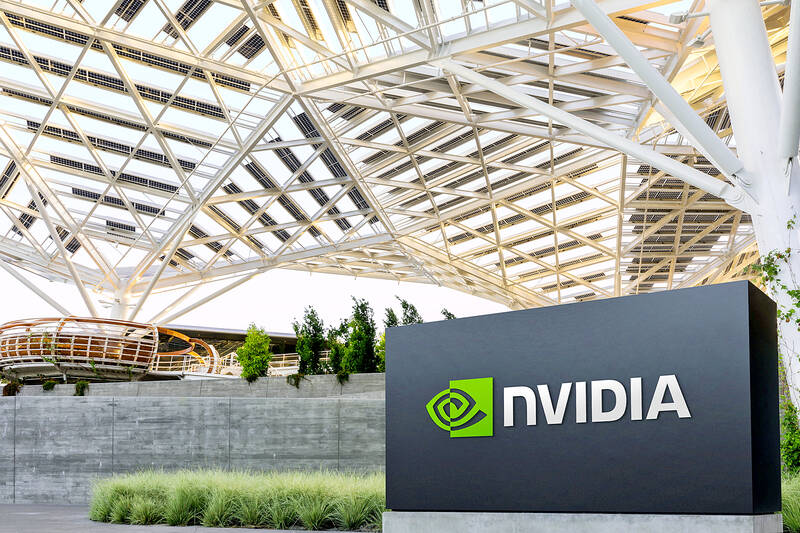Investors who snapped up shares of Nvidia Corp at the bottom of last month’s swoon were given a harsh reminder of the multiple forces pushing and pulling on the chipmaker’s business prospects.
What looked like a prescient bet last month — the stock surged 14 percent over 15 trading days — turned sour last week as shares tumbled on new US chip rules on China, a move that threatens a chunk of the one-fifth of Nvidia’s revenue that came from that country last quarter.
It was another harsh reminder for Nvidia fans that for all the hype around its position as a primary beneficiary of the artificial intelligence (AI) gold rush, the company’s more immediate prospects are at the mercy of the geopolitical struggle over the chips that power virtually every aspect of the modern world. It is also not immune to rising interest rates and the economic concerns weighing on markets.

Photo: Reuters courtesy of Nvidia
Nvidia vaulted to the top of performance charts in May after it gave a sales forecast that shattered analyst expectations and solidified the chipmaker as a main beneficiary of the AI trend. The stock’s record surge put Nvidia’s market capitalization in reach of US$1 trillion, a level it surpassed in June.
At its next earnings release in August, another blowout report catapulted shares to an all-time high.
Since reaching that peak, performance has been rockier. Shares fell 12 percent last month, Nvidia’s worst monthly performance this year, weighed down by concerns about demand sustainability.
The stock fell nearly 9 percent last week, but is still up 188 percent this year and remains the top performer on the S&P 500 and NASDAQ 100.
So far, Wall Street analysts have not changed their bullish tune on the stock.
While some have cut price targets, 95 percent of analysts have a buy-equivalent rating on Nvidia, data compiled by Bloomberg showed.
“This is a significant setback, but business is likely to continue to exceed expectations despite that,” Morgan Stanley analysts led by Joseph Moore — who recommended buying the stock in its September dip — wrote in a note on Wednesday last week, adding that Nvidia is still their top pick in the semiconductor sector.
Silvant Capital Management LLC chief investment officer Michael Sansoterra said the added export restrictions for China shipments hardly dent Nvidia’s long-term appeal.
“You’re going to see some volatility in the stock that’s not pleasant to go through, but it’s also not unexpected,” he said. “We like Nvidia in our portfolio, and we see value when it pulls back.”

When an apartment comes up for rent in Germany’s big cities, hundreds of prospective tenants often queue down the street to view it, but the acute shortage of affordable housing is getting scant attention ahead of today’s snap general election. “Housing is one of the main problems for people, but nobody talks about it, nobody takes it seriously,” said Andreas Ibel, president of Build Europe, an association representing housing developers. Migration and the sluggish economy top the list of voters’ concerns, but analysts say housing policy fails to break through as returns on investment take time to register, making the

NOT TO WORRY: Some people are concerned funds might continue moving out of the country, but the central bank said financial account outflows are not unusual in Taiwan Taiwan’s outbound investments hit a new high last year due to investments made by contract chipmaker Taiwan Semiconductor Manufacturing Co (TSMC, 台積電) and other major manufacturers to boost global expansion, the central bank said on Thursday. The net increase in outbound investments last year reached a record US$21.05 billion, while the net increase in outbound investments by Taiwanese residents reached a record US$31.98 billion, central bank data showed. Chen Fei-wen (陳斐紋), deputy director of the central bank’s Department of Economic Research, said the increase was largely due to TSMC’s efforts to expand production in the US and Japan. Investments by Vanguard International

WARNING SHOT: The US president has threatened to impose 25 percent tariffs on all imported vehicles, and similar or higher duties on pharmaceuticals and semiconductors US President Donald Trump on Wednesday suggested that a trade deal with China was “possible” — a key target in the US leader’s tariffs policy. The US in 2020 had already agreed to “a great trade deal with China” and a new deal was “possible,” Trump said. Trump said he expected Chinese President Xi Jinping (習近平) to visit the US, without giving a timeline for his trip. Trump also said that he was talking to China about TikTok, as the US seeks to broker a sale of the popular app owned by Chinese firm ByteDance Ltd (字節跳動). Trump last week said that he had

STRUGGLING TO SURVIVE: The group is proposing a consortium of investors, with Tesla as the largest backer, and possibly a minority investment by Hon Hai Precision Nissan Motor Co shares jumped after the Financial Times reported that a high-level Japanese group has drawn up plans to seek investment from Elon Musk’s Tesla Inc to aid the struggling automaker. The group believes the electric vehicle (EV) maker is interested in acquiring Nissan’s plants in the US, the newspaper reported, citing people it did not identify. The proposal envisions a consortium of investors, with Tesla as the largest backer, but also includes the possibility of a minority investment by Hon Hai Precision Industry Co (鴻海精密) to prevent a full takeover by the Apple supplier, the report said. The group is